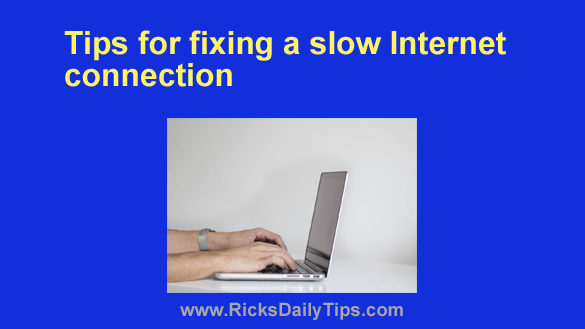 As you probably know, the dependency on the Internet has increased by leaps and bounds over the years.
As you probably know, the dependency on the Internet has increased by leaps and bounds over the years.
Covid 19 and the consequent remote work culture has made this dependency even more severe, exacerbating the usual frustration we feel when our Internet connection slows to a crawl.
In many cases it can be difficult to pinpoint the reason(s) behind a sluggish Internet connection. If you’re struggling with this issue, this post just might be a help to you.
Here are a few of the most common reasons for a slow Internet connection:
1 – Too many connected devices
The amount of smart devices in people’s homes has increased tenfold over the past few years. Many of these smart devices make use of your home’s Internet to function. Thus, they occupy a significant chunk of the bandwidth provided to you by your internet service provider (ISP).
If your Internet is slow, it might very well be worth it to recall if you have recently installed a Google Home or Alexa at your place. In the case that you did install one or multiple home automation devices, you have found the cause behind the slowness of your connection.
By the way, smart devices aren’t the only things that consume valuable bandwidth. Your Internet speed might very well be slow because of an increase in the number of mobile phones or laptops connected to your WiFi.
But you do have a couple of options:
1) Remove those devices and stop using them.
2) Increase the speed of your Internet by either changing Internet Service Providers (ISPs) or upgrading to a faster Internet service tier.
2 – Excessive background data usage
Do you have too many apps running on your device at the same time?
Just because you are not currently using an app does not mean it is not taking up bandwidth. In fact, a lot of personal computer programs and cell phone apps take up high amounts of bandwidth.
To prevent any wastage of bandwidth, make sure you shut down all apps that you are not currently using.
3 – Poor location in your building
Another reason for a slow Internet connection is a poor location within your home or office.
There are two types of WiFi: one’s distribution entirely depends on a router in one location of your building while the other uses multiple nodes (i.e. a mesh WiFi system) to provide symmetrical coverage throughout the building.
If you have a single router or gateway, how far you are from your router significantly impacts the quality of your Internet connection.
If a weak WiFi signal is causing your slow connection, you can temporarily move your computer closer to your router. However, for the long term, you might want to consider installing a mesh router system that will provide symmetrical coverage.
4 – Faulty wiring
Just as issues can arise with your WiFi, issues can also arise with wired Internet connections.
Using a low quality or damaged Ethernet cable can negatively impact your connection to the router.
If you are experiencing slow Internet on a wired connection, try using a different Ethernet cable. If you do not have an alternate wire, look for signs of wear and tear on the wire. If they are present, there is a high likelihood your wire is causing the malfunction.
5 – Viruses and other forms of malware
Another issue that could be impacting the speed of your connection is the presence of malware, such as viruses.
New viruses and malware are constantly being developed and spread by hackers and scammers for the purpose of damaging computers all around the world and stealing users’ personal and financial info. These viruses impact the overall performance of your computer, including the speed at which you can use the Internet.
If you are experiencing slow Internet connectivity and you see no issue with the availability of bandwidth, location of the WiFi router, or wiring, I recommend that you run an antivirus scan.
6 – Using a sluggish VPN
Last but not least, tunneling your connection through a slow virtual private network (VPN) can also slow down your Internet data transfer speeds.
If you have investigated all scenarios mentioned above and you still cannot diagnose why your Internet is being slow, check to see if you are connected via a VPN. If you are, try connecting to a different one.
In my humble opinion, paying for a good VPN is cheaper than bearing the cost of inefficiency due to a low-quality free VPN.
Conclusion
By this point, I hope you have diagnosed the cause of your slow Internet and found a solution.
If you haven’t, know that although the scenarios mentioned above are the most commonplace, the list is not exhaustive and there can many more reasons for the lack of speed of your Internet. Calling your ISP might be a good idea as its customer service representatives might be able to help you solve the issue.